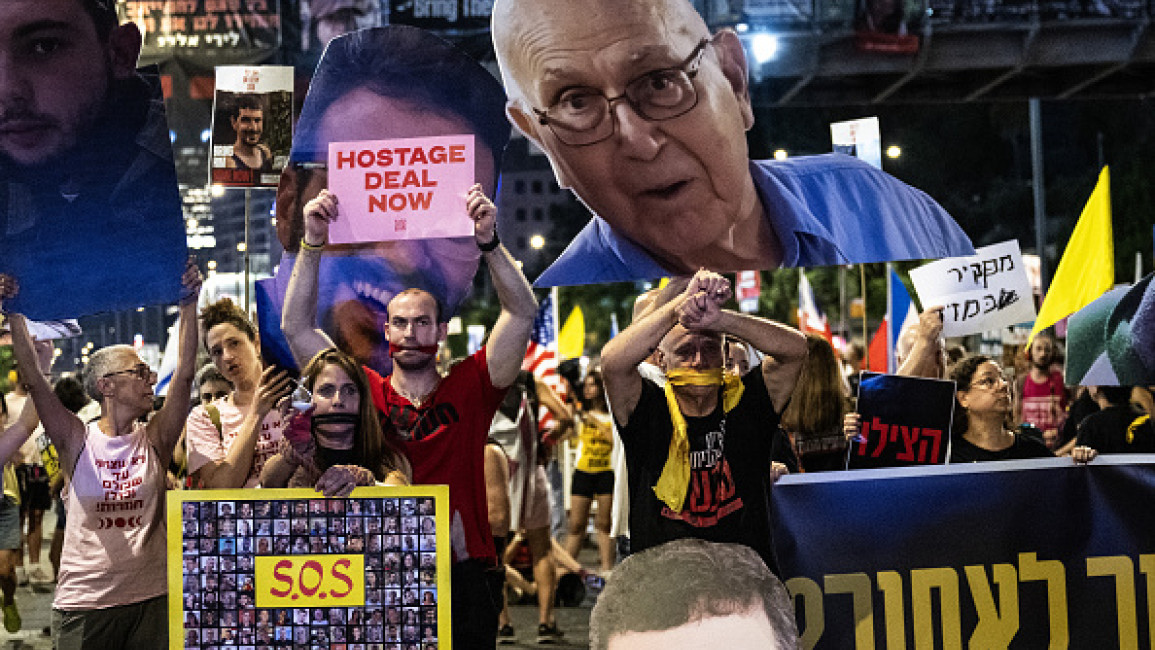Slain Israeli captives likely killed by Israel's bombing of Gaza, army investigation reveals
Israeli captives whose bodies were recently retrieved from Gaza may have been killed by Israeli bombing, a preliminary investigation by the Israeli army has found.
Examiners said that the captives may have died as a result of carbon dioxide flooding the tunnel in which they were held, Ynet reported on Tuesday.
When asked about whether the army may have killed the captives, Israeli military spokesman Rear Adm. Daniel Hagari reiterated an earlier statement from June, which said "The hostages were killed while our forces were operating in Khan Younis", without confirming the causes of their deaths.
Hagari said the bodies were also examined by the Israeli Institute of Forensic Medicine, adding that the public and the families of the deceased would be informed of the army's findings.
Israel announced on Tuesday that it had retrieved the bodies of Yagev Buchshtab, Alexander Dancyg, Yoram Metzger, Nadav Popplewell, Chaim Perry — all previously announced dead — and Avraham Munder, whose kibbutz of Nir Oz near Gaza announced his death earlier on Tuesday.
Hamas' armed wing said in June that British-Israeli dual national Popplewell had died of wounds inflicted by an Israeli airstrike more than a month prior, and in March that Buchstab had died due to a "lack of medicine and food" and Dancyg due to an Israeli airstrike.
Munder's Kibbutz of Nir Oz announced his death on Tuesday, describing it as a "murder".
Israeli army and media have put the blame on Hamas for the captives' deaths since October, while Hamas has accused Israel on several occasions of bombing locations where they were held.
The six Israelis' bodies were retrieved after clashes with Hamas fighters at a tunnel in Khan Younis, according to the Israeli army.
'Blood on their hands'
On Wednesday, Israeli media reported that Israel had missed the opportunity to receive three elderly captives in November after it rejected a Hamas proposal.
The Hebrew-language Ynet website reported that negotiations between the two sides broke down over what would have been the eighth batch of released hostages.
Hamas had offered to release ten captives, including seven women and children, and would complete the deal with three elderly people.
Two days earlier, the Palestinian group said that captives Sheri Bibas and her two children could not be included in a deal due to having been killed in an Israeli airstrike.
Israeli intelligence reportedly indicated that Hamas was holding more women who could be included in the deal, pushing the government's insistence that they be included.
Former army chief Gadi Eisenkot was the only member of the war cabinet to have accepted the deal before it was dismissed, according to Ynet.
Munder, whose death was announced on Tuesday, was on the list of those set to be released in the failed deal.
Speaking to Israel's Radio 103FM, Munder's nephew Shahar Mor Zahiro said Israel's government had "wasted opportunities" to free his relative and others.
"It's impossible to ignore the feeling of rage. For the terrible negligence that led to his kidnapping on October 7 and the ongoing negligence in the decision not to release and save him while he was still alive," Shahar said.
Other bereaved relatives also spoke out to criticise the Netanyahu government's strategy.
"He and all the hostages could have been brought back," Mat Dancyg, son of Alexander Dancyg, told Israel's Kan broadcaster. "Netanyahu chose to sacrifice the hostages. Karma will judge him and he will pay for it, big time."
Political figures also weighed in, with former primer minister Yair Lapid saying "They were alive!" on X.
Captives killed
Since Israel began its assault on Gaza in October, Hamas has accused it several times of bombing areas where captives were held.
In January, the mother of soldier Ron Sherman took to Facebook to accuse Israel's government of killing her son, who was taken captive by Hamas on 7 October.
"Ron was indeed murdered... but not by Hamas," Mayaan, Ron's mother, wrote on Facebook on January 16, according to Israel's +972 Magazine. Writing after seeing the findings of a pathology report provided by the army, the bereaved mother said her son was killed by "bombings with poisonous gases".
Speaking later to +972 and Local Call, she said that the army "doesn't rule out" gas poisoning as a cause of death. Ron Sherman's body was recovered by the army in mid-December.
Israel has also been accused of using the 'Hannibal directive' since 7 October — a military protocol where Israeli soldiers would kill captives and their captors to stop enemies from being able to use Israeli citizens as bargaining chips.
A Haaretz investigation published in July based on soldiers' testimonies and documents found that the procedure was being used "from the first hours following the [7 October] attack and at various points along the border".
Earlier in August, Hamas said a guard had broken orders and killed a captive after his family were killed in an Israeli airstrike.
Out of 251 people taken hostage on 7 October by Hamas and allied groups, 105 are still being held inside the Gaza Strip, including 34 the military says are dead.




 Follow the Middle East's top stories in English at The New Arab on Google News
Follow the Middle East's top stories in English at The New Arab on Google News
![The US vetoed a UN Security Council (UNSC) resolution demanding a ceasefire in Gaza [Getty]](/sites/default/files/styles/image_330x185/public/2185152251.jpeg?h=7ef8ac04&itok=RpLSj2pu)

![An attack by paramilitary forces in Sudan has killed at least 40 people [Getty]](/sites/default/files/styles/image_330x185/public/2182364341.jpeg?h=a5f2f23a&itok=r8Fkhxdj)